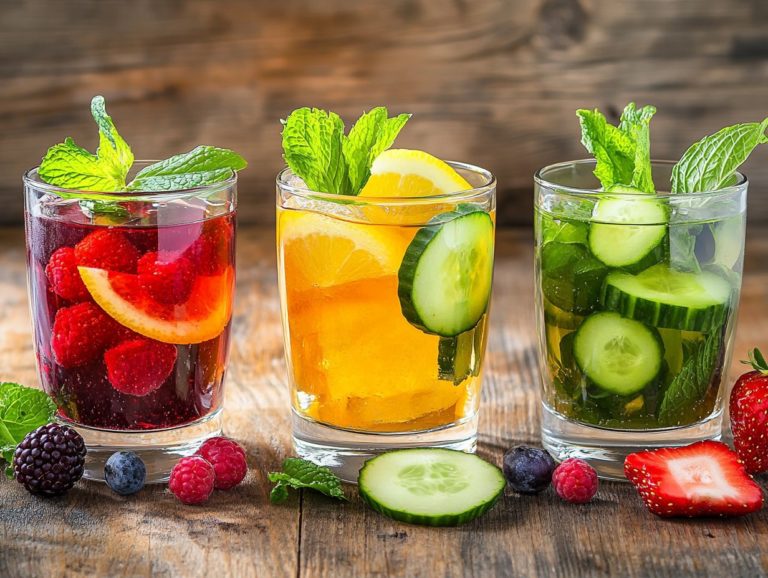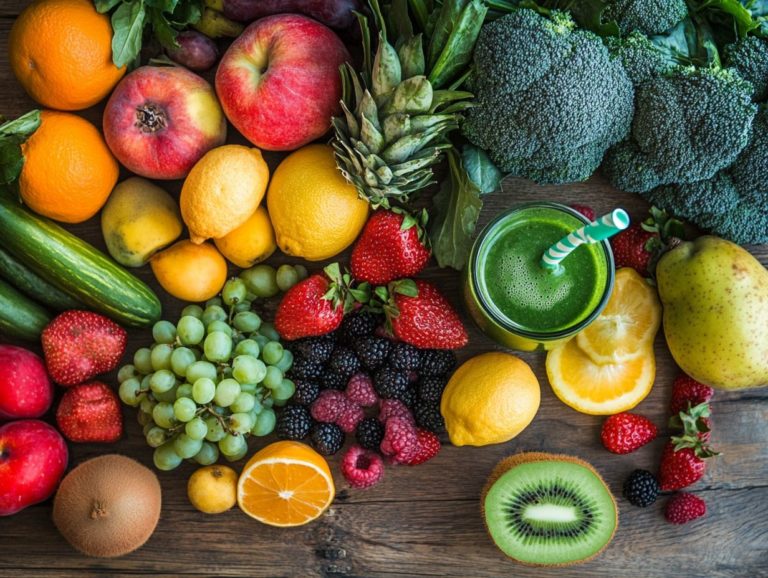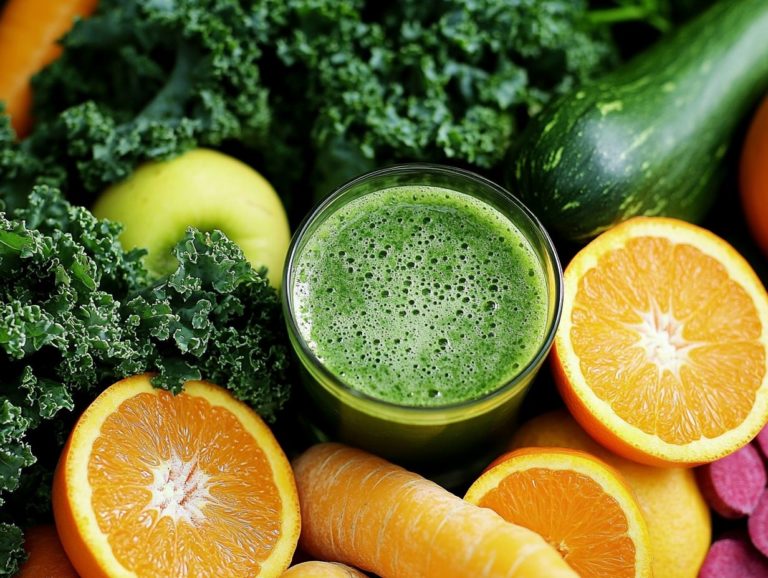The Relationship Between Nutrition and Detox
Detoxification has emerged as a prominent term in the health and wellness arena, yet grasping its complexities is vital for achieving effective results.
This article delves into the essential connection between nutrition and detox processes. Specific nutrients can enhance your body s natural cleansing abilities. You ll find an exploration of popular detox diets, a discussion of crucial nutritional elements, and indispensable tips for a successful detox experience.
Hydration is key to your detox success! We will also shed light on potential risks linked to detox diets. Join us and discover how easy it is to elevate your detox journey through well-informed nutritional choices.
Contents
- Key Takeaways:
- The Importance of Nutrition in Detoxification
- Common Detox Diets and Their Nutritional Components
- Nutrition Tips for a Successful Detox
- The Role of Proper Hydration in Detoxification
- Potential Risks and Considerations for Detox Diets
- Addressing Nutritional Deficiencies and Potential Side Effects
- Frequently Asked Questions
- What is the relationship between nutrition and detox?
- How does nutrition impact our body’s ability to detoxify?
- What are some nutrient-rich foods that support detoxification?
- Can poor nutrition hinder the body’s detoxification process?
- Are there any specific diets or eating patterns that support detoxification?
- How can nutrition and detox work together to improve overall health and wellness?
Key Takeaways:
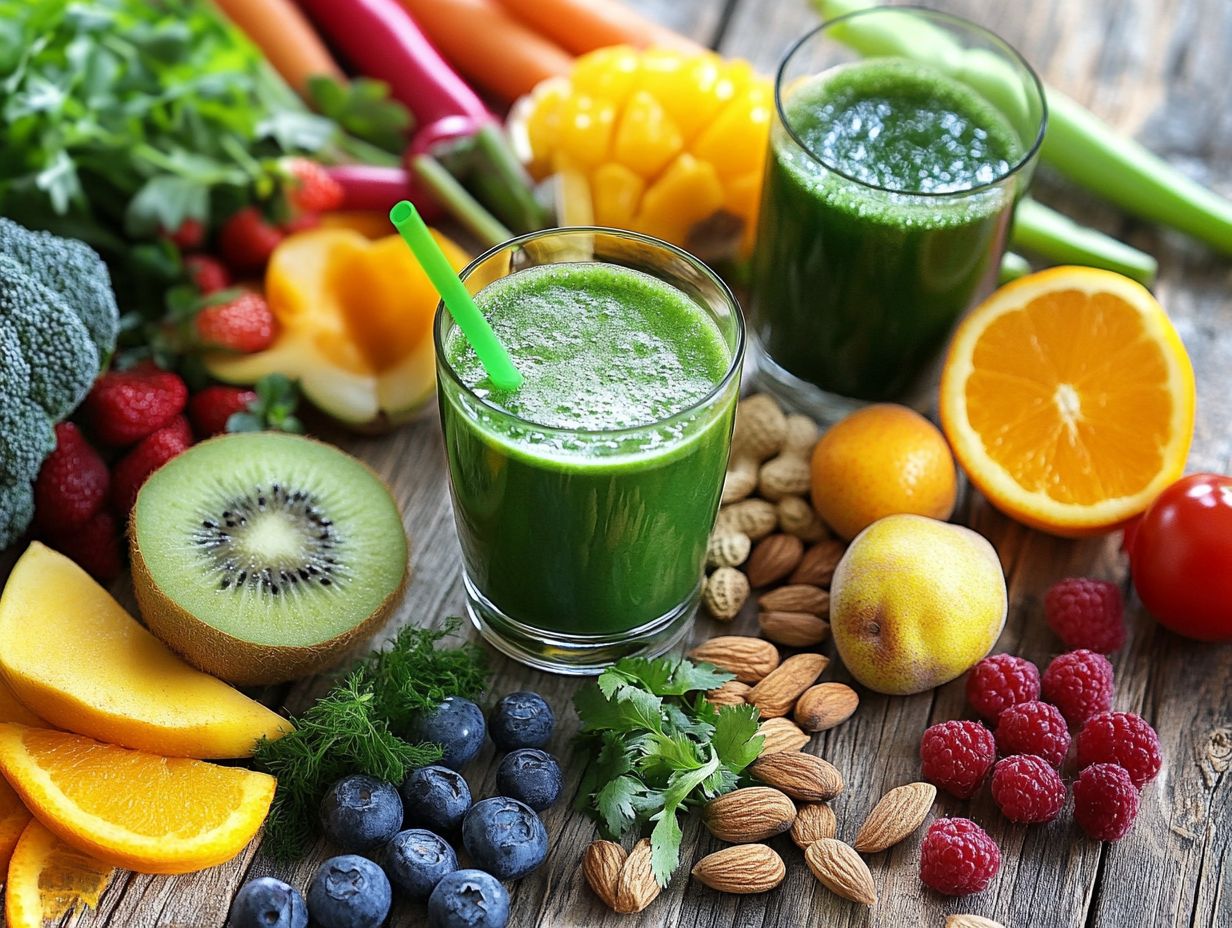
- Proper nutrition is crucial for a successful detox as it supports and enhances the body’s natural detox processes.
- Different detox diets may have varying nutritional components, so it is important to understand and choose one that fits your needs and goals.
- Focusing on key nutrients such as antioxidants, fiber, and hydration can help maximize the benefits of a detox and minimize potential risks.
The Importance of Nutrition in Detoxification
Nutrition plays a crucial role in detoxifying your body, especially for those struggling with drug or alcohol addiction. It provides the essential nutrients your body needs to function effectively and enhances your overall health.
A thoughtfully structured diet not only assists in detoxification but also addresses nutrient deficiencies, boosts liver function, and supports brain health. Additionally, understanding the relationship between saunas and skin health can enhance overall wellness, making nutrition an essential component of any addiction treatment and recovery journey.
How Nutrients Support Detoxification Processes
Nutrients are essential for supporting your detoxification processes, boosting antioxidant activity, promoting gut health, and improving nutrient absorption all vital elements when you’re on a detox diet.
Certain vitamins like C and E, along with minerals such as selenium and zinc, play a pivotal role in neutralizing free radicals. This helps reduce oxidative stress and alleviates the impact of metabolic toxins your body encounters daily. Prebiotics are equally important, as they nurture beneficial gut bacteria that assist in eliminating waste and harmful substances.
A nutrient-dense diet provides these crucial components and supports optimal liver function, enhancing your body’s natural detox mechanisms.
By incorporating a vibrant array of colorful fruits, vegetables, whole grains, and healthy fats, you can enrich your detox journey and elevate your overall well-being.
Common Detox Diets and Their Nutritional Components
Common detox diets encompass a diverse range of nutritional elements, emphasizing whole foods, hydration, and optimal nutrient absorption.
These practices facilitate detoxification and enhance overall health, particularly for individuals struggling with substance use disorders.
Understanding Different Detox Diets
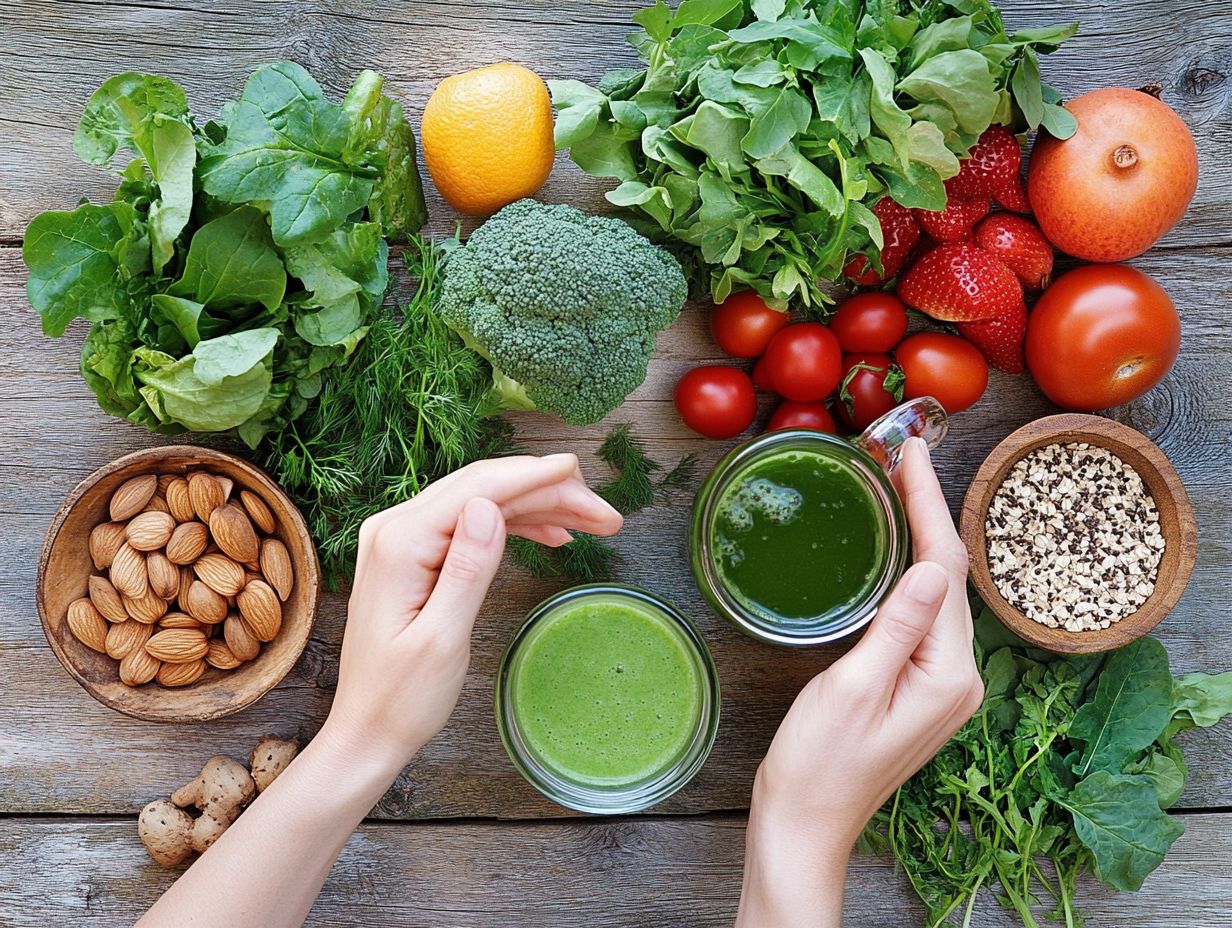
Understanding the various detox diets like juice cleanses, raw food diets, and elimination diets can help you choose the best approach for your detoxification needs, especially when tackling concerns such as chronic diseases or addiction.
Each of these diets serves a distinct purpose and offers a range of health benefits. However, they also come with their own challenges that require thoughtful consideration. For instance, juice cleanses aim to deliver a swift boost of vitamins and minerals while giving your digestive system a break. However, if followed for too long, they can lead to nutrient deficiencies.
On the flip side, raw food diets emphasize unprocessed plant-based foods, which can greatly enhance your overall health. Yet, they may pose risks for those with weakened immune systems if not properly balanced.
Elimination diets can be useful for pinpointing food sensitivities, helping individuals with conditions like irritable bowel syndrome or eczema. However, they can unintentionally cut out essential nutrients if not closely monitored.
By carefully weighing the pros and cons of each diet, you can make informed choices that align with your health goals and lifestyle.
Nutrition Tips for a Successful Detox
Implementing effective nutrition tips can significantly elevate the success of a detox program, particularly for those grappling with addiction.
By focusing on a healthy diet, you not only support your overall health but also foster a greater sense of well-being throughout the detoxification process.
Key Nutrients to Focus on During a Detox
Key nutrients such as vitamins, minerals, and proteins are essential for you to focus on during a detox. They support nutrient absorption and play a significant role in the healing process.
This is especially important if you’re recovering from substance use disorders.
Among these nutrients, B vitamins are particularly vital for energy production and mental clarity. Incorporating foods like whole grains, eggs, and leafy greens into your diet can make a world of difference. Omega-3 fatty acids, found in fatty fish, flaxseeds, and walnuts, can elevate your mood and help reduce anxiety.
Antioxidants like vitamin C, sourced from citrus fruits and vegetables, help combat damage caused by harmful substances in the body.
Don t overlook magnesium, either. This mineral, found in nuts, seeds, and dark chocolate, aids in relaxation and muscle recovery, easing the tension often associated with withdrawal symptoms.
By prioritizing these nutrients, you not only support your liver function but also enhance your overall health and mental well-being during your recovery journey. It’s also important to be aware of potential hazards; for instance, understanding the health risks of saunas can contribute to a safer wellness practice.
The Role of Proper Hydration in Detoxification
Proper hydration is essential for detoxification, significantly enhancing liver function and enabling your body to effectively flush out waste products. This is particularly crucial for those navigating the challenges of substance use disorders and experiencing withdrawal symptoms.
Staying well-hydrated supports your body s natural processes, enabling your journey to recovery.
How Water Supports the Detox Process
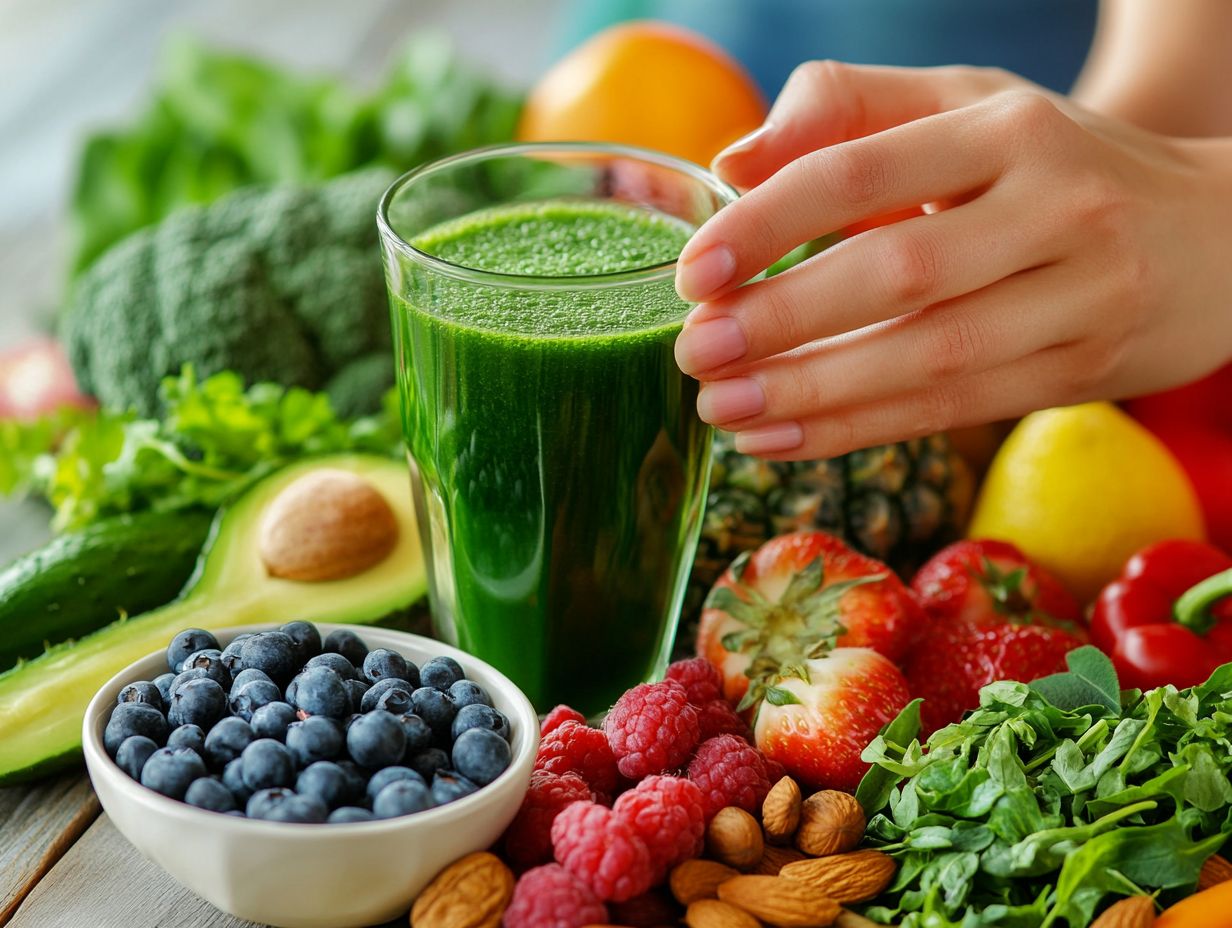
Water is your ally in the detox process, ensuring you stay adequately hydrated, facilitating nutrient absorption, and helping eliminate waste products from your body.
This vital liquid plays a crucial role in maintaining your kidney function, allowing these essential organs to filter waste effectively and regulate your bodily fluids. A well-hydrated digestive system promotes optimal gut health, preventing issues like constipation and aiding in the smooth breakdown of food.
When you’re properly hydrated, nutrient absorption is enhanced, ensuring you reap the full benefits of what you consume.
To boost your daily water intake, consider these strategies:
- Carry a reusable water bottle with you
- Set reminders on your phone to take a sip
- Incorporate hydrating foods such as cucumbers, watermelon, and oranges into your meals
Embrace these easy tips to make hydration fun and exciting!
Potential Risks and Considerations for Detox Diets
While detox diets can provide a range of benefits, it’s vital to understand the potential risks and considerations involved. These may include nutritional deficiencies and health challenges, particularly for individuals with pre-existing conditions or those navigating stress and anxiety.
Addressing Nutritional Deficiencies and Potential Side Effects
Taking care of nutritional deficiencies is vital when starting detox diets. Ignoring this can lead to side effects that slow down your healing and complicate treatment for addiction.
Many individuals diving into detox plans often underestimate the importance of balanced nutrition. This can inadvertently deprive their bodies of essential vitamins and minerals. Understanding the connection between detox and weight loss can help prevent common deficiencies, such as B vitamins, magnesium, and omega-3 fatty acids, which are pivotal for sustaining energy levels, enhancing mental clarity, and promoting overall well-being.
The consequences of these deficiencies may show up as fatigue, irritability, and even muscle cramps. To counter these risks, you must prioritize integrating a varied diet rich in whole foods, including leafy greens, nuts, and fatty fish.
Supplementation can act as a safety net, ensuring that your nutritional needs are adequately met while supporting your body s recovery during this critical time.
Frequently Asked Questions
What is the relationship between nutrition and detox?
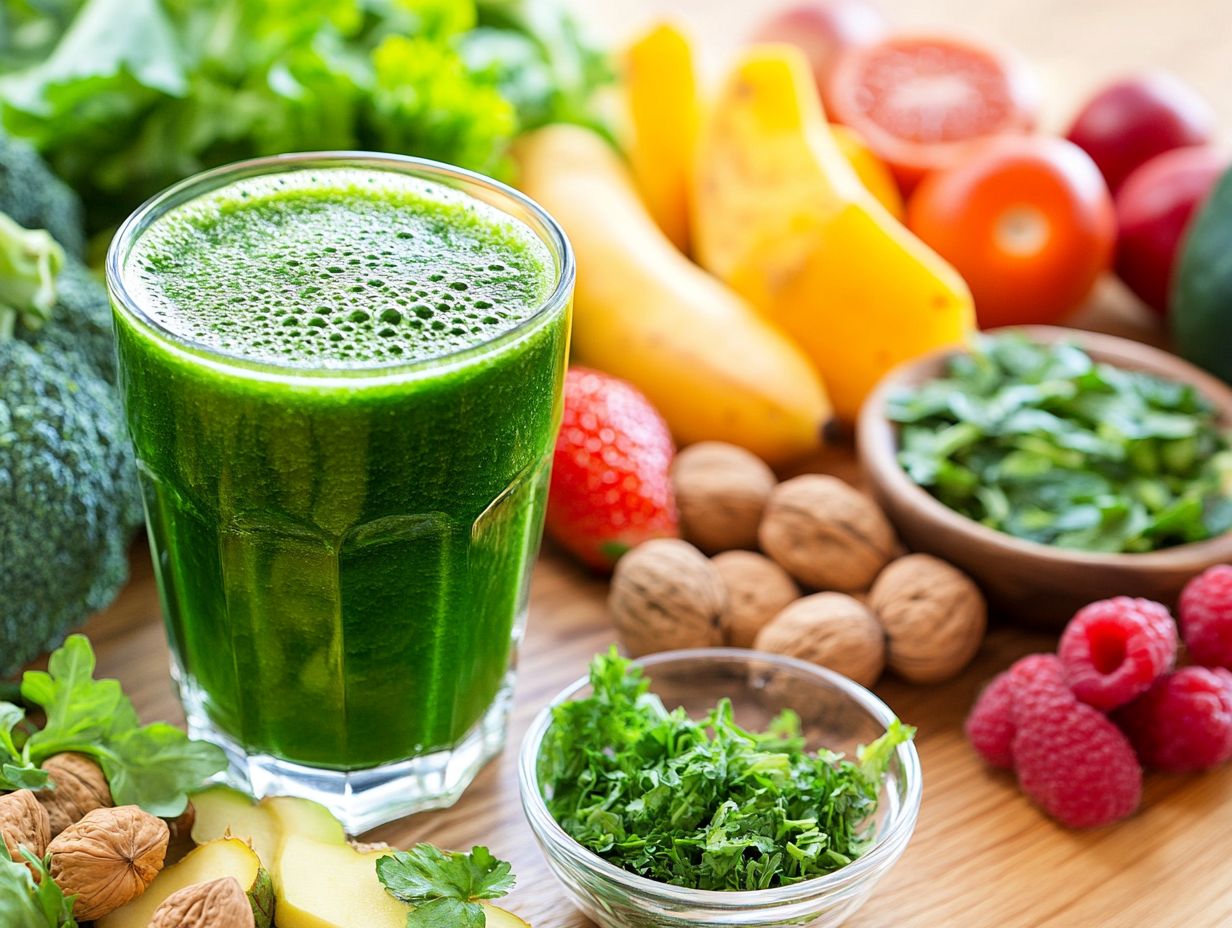
The relationship between nutrition and detox is significant. The foods we consume can either support or hinder our body’s natural detoxification processes. By nourishing our bodies with nutrient-dense foods, we can help eliminate toxins and promote overall health and wellness.
How does nutrition impact our body’s ability to detoxify?
Nutrition plays a crucial role in our body’s detoxification processes. Certain nutrients, such as antioxidants and fiber, help protect our cells from damage caused by toxins. They also support the elimination of toxins through our digestive system.
What are some nutrient-rich foods that support detoxification?
Foods rich in antioxidants, such as leafy greens, berries, and cruciferous vegetables, are excellent choices for supporting detoxification. Other beneficial foods include whole grains, lean proteins, and probiotic-rich options like yogurt and kefir.
Can poor nutrition hinder the body’s detoxification process?
Yes, poor nutrition can hinder the body’s detoxification process. It can overload the liver and other detoxifying organs with unhealthy foods such as processed items, sugar, and unhealthy fats. These foods can also cause inflammation and cell damage, making it difficult for the body to eliminate toxins effectively.
Are there any specific diets or eating patterns that support detoxification?
While there is no specific diet solely focused on detoxification, incorporating whole, nutrient-dense foods into your meals can support your body’s natural detoxification processes. Drinking enough water also helps flush out toxins from the body.
How can nutrition and detox work together to improve overall health and wellness?
Nourishing our bodies with a balanced and nutrient-rich diet supports our body’s natural detoxification processes. This can improve our overall health and wellness. A healthy, detoxifying diet can also help boost our immune system, enhance our energy levels, and support healthy weight management.

